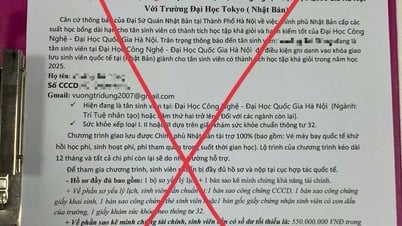 |
| Ms. Nguyen Thi Cuc, Chairwoman of Vietnam Tax Consultants Association. (Photo: Investment Newspaper) |
Unlike previous VAT reductions, this time, do you think the Government is quite bold in submitting to the National Assembly the proposal to reduce VAT?
The National Assembly has begun to reduce VAT from 10% to 8% for most goods and services since 2022. To date, a total of 5 resolutions have been issued on this issue. Each resolution only reduces tax for 6 months, which is generally very "bite-sized". This time, the Government submitted to the National Assembly a VAT reduction from July 1, 2025 to the end of 2026, which is 3 times longer than previous times. In the context that the state budget is in dire need of revenue to pay for reforming the administrative apparatus and the entire political system from the central to local levels, eliminating district/county levels, and merging communes/wards, the VAT reduction until the end of 2026 is very meaningful.
According to the Ministry of Finance 's calculations, this VAT reduction alone will reduce state budget revenue by about VND 121,740 billion. Of which, the last 6 months of 2025 will reduce VND 39,540 billion (already balanced in the revenue estimate), and in 2026, it will reduce another VND 82,200 billion.
Unlike other taxes, VAT affects all organizations, individuals, businesses, and consumers; affects both production, circulation, and final consumption; affects both input and output of economic activities, so reducing VAT has an "immediate" impact on the whole society.
This tax reduction is especially meaningful, because in the coming time, Party congresses at all levels will be held, followed by the 14th National Party Congress, elections of the National Assembly and People's Councils at all levels, which means there will be a new Central Executive Committee, National Assembly, Government, People's Councils and local authorities to implement the Socio-Economic Development Plan 2025-2030, so the 2% VAT reduction is like a stimulant for production and business activities, an encouragement from the Party and State to people and businesses when they start implementing the Socio-Economic Development Plan for the next period and completing the Socio-Economic Development Strategy for the 2021-2030 period.
In addition to extending the time, this tax reduction also expands the beneficiaries. What do you think about this?
In previous VAT reductions, many groups of goods and services were excluded, such as telecommunications, information technology, financial activities, banking, securities, insurance, real estate business, metals, prefabricated metal products, mining products (excluding coal mining), coke, refined petroleum, chemical products, goods and services subject to special consumption tax. This time, the tax reduction subjects are expanded, including information technology products and services (such as washing machines, microwave ovens, data processing services, leasing and related activities, information portals, etc.), prefabricated metal products; coke, refined petroleum; chemical products; gasoline (subject to special consumption tax).
By reducing VAT, consumers benefit immediately due to the reduction in the purchase price of goods and services. Meanwhile, with the expansion of tax reduction subjects this time, businesses benefit greatly as gasoline, coke, refined petroleum (fuel oil and gasoline, lubricating grease), chemical products such as fertilizers, plastics, synthetic rubber, etc. are goods and raw materials used in the production process. When input tax is reduced, businesses reduce production costs, reduce product prices, thereby reducing selling prices, consumers benefit a second time, and businesses increase their competitiveness and expand their operations.
What about the economy, madam?
According to the Ministry of Finance, in 2022, the amount of budget revenue reduction, that is, support for people and businesses through VAT reduction, is VND 51,400 billion, in 2023 it is VND 23,400 billion (due to the reduction in only the last 6 months of the year) and in 2024 it is VND 49,000 billion, contributing to increasing total retail sales of goods and consumer service revenue, controlling inflation, but the state budget in the following year increased higher than the previous year and all revenues exceeded the estimate. Thanks to the tax reduction, production and business have been supported, and economic growth in the past 3 years has reached 8.54%; 5.07% and 7.09%, respectively.
While many countries in the world have had to deal with inflation in the past 3 years, our country's price index only increased by 3.15%; 3.25% and 3.63% respectively in the 2022-2024 period, partly thanks to the reduction of VAT from 10% to 8%. Reality has shown that controlling inflation has created room to implement flexible and open fiscal and monetary policies, increase public investment, stimulate consumption, contribute to economic growth, create jobs, and increase people's income. This is the premise for the Government to boldly submit to the National Assembly to continue reducing VAT until the end of 2026, while expanding the subjects eligible for tax reduction.
VAT is a domestic tax. How do you think the reduction of domestic tax will affect import and export activities?
Normally not, but this time yes. We all know that the US has announced an import tax of up to 46% on goods from Vietnam because they think that we impose a tax of up to 90% on imported goods from the US, while in reality, we only impose an average tax of about 15% on imported goods from the US. They calculated that the import tax rate of Vietnam on their goods is so high because it includes VAT on their goods. The reason is that in the world, most countries impose VAT, while the US does not have this tax (there is only sales tax of each state with different tax rates).
VAT is levied on all goods and services, regardless of whether they are domestic or imported. This time, we continue to reduce VAT until the end of 2026, which also contributes to reducing taxes on imported goods, including goods imported from the United States, creating favorable conditions for Vietnam to negotiate with the United States on reciprocal taxes.
VAT reduction is just one of many policies to support businesses, especially private enterprises, according to Resolution 68-NQ/TW (dated May 4, 2025) of the Politburo on developing private enterprises. Therefore, at this session, the National Assembly passed a Resolution on a number of special mechanisms and policies for developing the private economy. Specifically, the State will improve the business environment; support access to land and production and business premises; support finance, credit and public procurement; support science, technology, innovation, digital transformation and human resource training; support taxes...
Although the tax reduction target has been expanded, some groups of goods and services are still subject to 10% VAT. What is your opinion on this issue?
If possible, taxes can be reduced for all goods and services; otherwise, it can be extended to financial, banking, securities, and insurance activities. According to the Ministry of Finance, the reason for not reducing VAT for financial, banking, and insurance activities is because services in these fields are not subject to VAT and financial services have had good growth in recent times.
This explanation is also reasonable, but for credit activities, in my opinion, VAT should be reduced to 8% to create conditions for businesses and people to access cheaper capital. Consumers (borrowers) are the ones who pay VAT, if the tax is reduced, organizations, individuals and businesses will have access to cheaper capital, creating conditions for banks to expand credit activities with a growth target of 16-18% this year, to support economic growth of at least 8% as set by the National Assembly.
According to Investment Newspaper
https://baodautu.vn/giam-thue-gia-tri-gia-tang-tac-dong-ngay-toi-san-xuat-kinh-doanh-d285134.html
Source: https://thoidai.com.vn/giam-thue-gia-tri-gia-tang-tac-dong-ngay-toi-san-xuat-kinh-doanh-213682.html





























![[Photo] Nghe An: Provincial Road 543D seriously eroded due to floods](https://vphoto.vietnam.vn/thumb/1200x675/vietnam/resource/IMAGE/2025/8/5/5759d3837c26428799f6d929fa274493)




































































Comment (0)